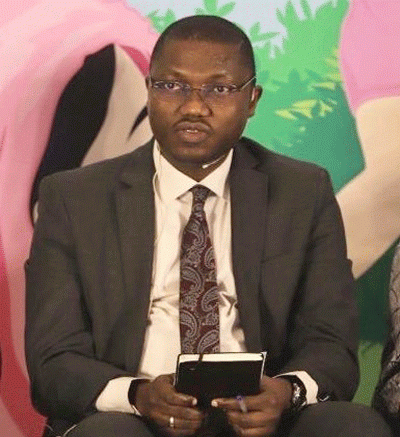
BY ELIZABETH MUPFUMIRA AND JOHN MOKWETSI
Young people from various backgrounds interfaced with the Unicef representative Tajudeen Oyewale on International Youth Day and called for greater engagement and more inclusive platforms to tackle issues around climate change, mental health, sexual reproductive health rights, education, arts and culture and entrepreneurship.
The virtual meeting was an opportunity for Oyewale to engage with young people in Zimbabwe for the first time since he joined the local office in June.
The exchange allowed the young people to highlight some of the critical issues facing adolescents and young people, thus allowing them to input into Unicef’s future programmes.
The dialogue covered a wide range of issues with the young people speaking passionately about the challenges they face, and made specific requests for Unicef to ensure that their rights are granted and protected.
Speaking on mental health, Rejoice Tafadzwa of Zimbabwe Young Ambassadors said: “Covid-19 has removed the essential human need, which is socialisation.
“Most young people are idle with nothing to do and no source of income, which has a direct effect on mental health due to stress.
“This is the reason we have a spike in drug abuse. I am advocating for Unicef to help in establishing rehab centres.”
- Chamisa under fire over US$120K donation
- Mavhunga puts DeMbare into Chibuku quarterfinals
- Pension funds bet on Cabora Bassa oilfields
- Councils defy govt fire tender directive
Keep Reading
Vanessa Chivizhe, a former junior parliamentarian concurred, pressing on the need for awareness around mental health.
“We should not wait for the physical manifestation of depression to take mental health as seriously as we do a person with a broken leg,” she said.
“We need collaborative efforts of raising awareness to show how serious the condition is to the well-being of people.
“Unicef should help us to convene as artists, health workers, parents and the general populace to educate and learn from each other.”
Mukudzei Madzivire, a former junior president pointed out that mental health was being hampered by negative narratives that caused stigma.
“Narratives are incredibly powerful because they infiltrate every corner of the society,” Madzivire said.
“In institutions like schools, you see all these biases in terms of how mental health is viewed and spoken about.
“We need generational dialogue of people, who came before us and the young people today.”
Oyewale said Unicef had taken note of the recurring call for community engagement with emphasis on platforms that supported youth awareness campaigns of mental health, which he said was of paramount importance going into the new country programme.
Tichaona Nhizwa, a disability activist, urged increased advocacy around the National Disability Policy, which most people with disabilities did not know about.
“Unicef has to assist people living with disabilities to get critical and helpful information, especially in dark areas such as rural areas,” Nhizwa said.
“This will allow them to be well-informed with the policy and what it can do for them.
“Unicef can help in coming up with information channels and engagement platforms for continuation of discourse,”he said.
Oyewale noted this as an action point saying: “I will take this to Unicef and brainstorm how we can create illustrated child-friendly versions and easy to understand adaptations of this policy to improve its understanding.
“I am aware that in Zimbabwe we have 15% of the population of disabled people, and among those about 50% are children and young people.
“We have to work with this group.”
There was a passionate plea from Vimbainashe Jazi, who works with children and adolescents pushing for Unicef to cover more around in the provision of HIV adherence counselling and differentiated service delivery aimed at improving retention, reduce virological accumulation of HIV, better communication channels, fighting stigma and psycho-support.
“We should not have new infections among young people,” Jazi said.
“There are a lot of legacy issues that are still leading to this and one of these is misinformation.
“Young people have a lot of misinformation channels that are leading to HIV testing hesitancy.
“The big elephant in the room is also stigma and lack of support from communities for those who are living with HIV.
“We need Unicef to facilitate platforms where we are free to speak on these issues.”
The other pertinent conversation Oyewale started was on climate change, which was an interesting subject for Nkosilathi Nyathi, the Unicef youth climate ambassador for Zimbabwe.
Nyathi said: “We must take a child-centred approach to climate action to ensure a sustainable future for everyone, including children and future generations.
“And if a partnership is needed to make this happen, we should do it.
“I am glad that Unicef has been supporting a lot of these activities that I am part of and I have managed to raise interest among my peers.”
He said young people must have a seat on the table as equal stakeholders in decision-making.
“Young people need to be empowered with funding to work on climate friendly projects,” Nyathi said.
“This feeds into points raised around supporting entrepreneurship for young people, a good case for the green economy.”
Oyewale committed to Unicef supporting linkages for entrepreneurship, education and internship and also emphasised working on opportunities around the green economy.
“The connection between education, apprenticeship, entrepreneurship, internship and eventually employment is something that we need to look into and that is where initiatives like Generation Unlimited are important,” Oyewale said.
He said Unicef would like to establish a sustained conversation and continuous engagement with young people to discuss ideas that could be fed into the agency’s programmes around adolescents and young people.
“My advice to young people is that you need to go to school,” Oyewale said.
“All the platforms and engagement Unicef gives you they are great to develop your person, but do not carry you far.
“What carries you far is your commitment to education and skills.”










